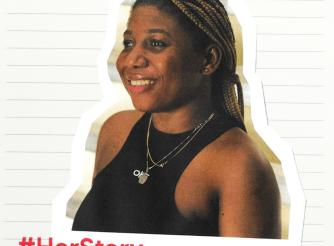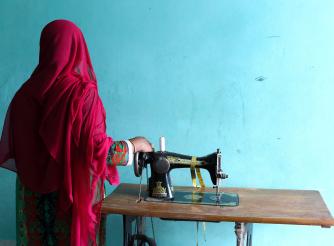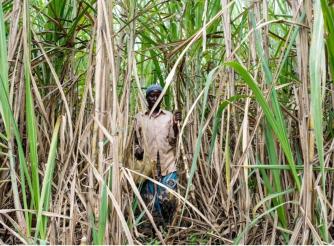Nurses fight to provide care despite funding cuts in Malawi
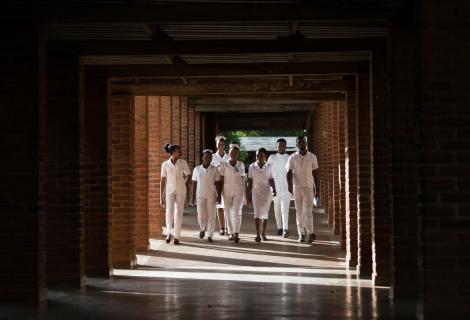
Young Urban Women (YUW) and The Nurses Association of Malawi (NAM)
ActionAid Malawi work with NAM through advocacy work. The Malawi government, as instructed by the IMF and World Bank, were told to freeze employment of nurses, doctors and teachers. ActionAid are working with NAM to amplify the voices of nurses, doctors and teachers to advocate for change.
ActionAid Malawi are forming a Young Urban Women’s (YUW) group for the nurses to allow for deeper conversations on how the coercive advice given by the IMF affects both unemployed and employed nurses, and how these can be challenged.
ActionAid's Young Urban Women’s (YUW) Programme addresses young women’s economic rights and sexual and reproductive health and rights (SRHR). Using a human rights based approach to development, the project places a commitment to building the active agency of young women living in poverty at its centre. This lays the foundation for addressing young women’s access to decent work and sexual and reproductive services simultaneously in three key ways: empowerment, campaigning and solidarity.
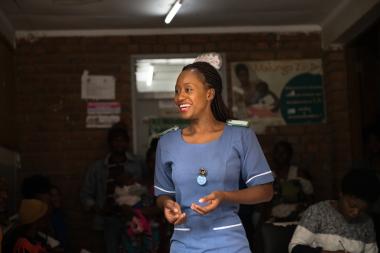
Mirium's story
Mirium is a Senior Nursing Officer, in Blantyre, who told us about the surge of cholera hitting hospitals in Malawi. Because of the increasing number of incoming patients, they have had to move patients into the outpatient department as a last resort, despite the closeness and size of the facility making it inappropriate for this use.
Like the others we spoke to, Mirium highlighted how the lack of equipment and funding had huge impacts on the quality of care they can give patients. Public funding costs have had consequences on staffing, equipment, supplies, cleaning procedures, and ultimately the care of patients.
“The least likeable part of my job is not having enough equipment, enough resources for me to carry out my job as I as I've been taught in school. So most of the times we don't have the adequate equipment, adequate resources that we wish to have, so that we should provide quality nursing services, nursing quality care to the patients. So most of you find that you are admitting a patient, you don't even have stationery to write notes sometimes.”
Wage cuts have also stretched the nurse-to-patient ratio, and there are fewer nursing positions available for trained staff to take up. Mirium told us there are a lot of unemployed nurses and midwives who she fears will take overseas opportunities so that they can work in their field.
“Public sector wage cuts has affected so much of the medical profession. I remember when I was graduating from nursing school in 2010, there was already a job for me. But now the wage cuts have created a lot of joblessness among nurses and other medical professionals. We've got a cohort from 2016 up to now, nurses and midwives, clinicians not employed because of the public sector cuts, staying at home, having diplomas and degrees, having spent all the years in colleges and staying at home without anything to do.”
Currently, Malawi is facing a rise in cholera. Nurses we talked to explained that the outbreak is pushing their health centres to their limits, as the resourcing was already overstretched.
“The biggest challenge with cholera right now is the lack of resources. That's the biggest challenge for us and not enough staff to help in responding to the cholera cases.The number of the amount of resources that we have are not enough for us to accommodate to all the cases that we are having”
Mirium told us that when this outbreak began, the surrounding communities were still using unsafe water supplies, increasing the risk of the disease spreading rapidly. Environmental health staff went out to surrounding homes to try to improve the situation and reduce the number of people getting sick, as the hospitals simply could not handle the volume of admissions.
“It has not been easy responding to the cholera... when the cases started coming, we did not have enough resources to handle the cases. Most of the health centres did not have an isolation ward because [they] are too small as they were built long time ago, just for the purposes of maternity and outpatient departments. It has been a challenge responding to all the cases because we do not have isolation places. [Patients were being cared for on] the veranda, under the trees, some [centres] even putting them together with patients with other conditions."
One of Mirium's biggest concerns was how a sick community today will have a long-lasting impact on the future of the country, both in terms of producing harvests and in the high death rate.
“If we are to have a productive community, we would need healthy community members. There are a lot of patients in the hospitals who are supposed to be in the fields now farming. So if a lot of people are coming into the hospital sick and not productive, we may not have enough food in the country. The country is losing a lot of people. The death rate is high. So the country is also losing productive men and women who have contributed positively to the development of the country.”
In any situation where tensions are high, it is often women who act as the 'shock-absorber' in a community, and are at an increased risk of violence. This cholera outbreak is no exception. Mirium says she and her (largely female staff) have experienced threats and attacks because of the fear of the disease in the community.
“The impact of cholera on women has been so negative that right now as it is in Malawi, most of community members feel like the nurses are contributing to the cholera cases in Malawi. So being a woman is very hard for you to defend yourself when the violent communities are coming to the health centres to attack you while you're doing your job... coming to the cholera camps to attack medical professionals accusing us that we are injecting people with cholera and everything. We cannot fight back as there are men and women with weapons coming to the facilities. So women will be affected negatively because we cannot fight back to the violent communities that are accusing us of contributing to the cholera cases in Malawi.”
During her schooling to become a nurse, Mirum benefited from government support which covered tuition fees. When she was in training, she and her other female peers felt that leadership opportunities were given to their male counterparts. Now, in a leadership position, Mirium feels empowered to lead and uses her voice to lift up women entering the profession.
“I have a few words to say to all young women in this country; we can stop at nothing, we can do anything. We can be anything that we want to be, if we can only push further, there's no room for giving up. There is no room for being timid. As young women, we can do greatness if we only believe in ourselves.”
Mirium is the Chairperson for National Organization for Nurses and Midwives in the South West of Malawi, campaigning and advocating for change.
“That's what drives you to continue to fight. Fight for women and people training for wanting to be in your profession.”
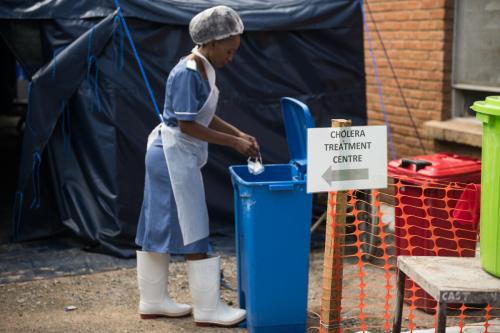
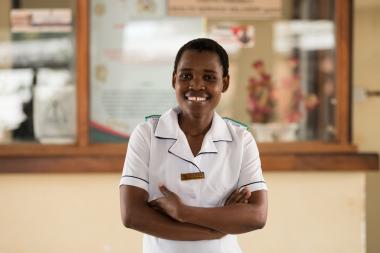
Norah's story
Norah is a paediatric nurse in Mchinji district hospital. Like other nurses, she is finding the cholera outbreak hard to manage with inadequate resources, describing the situation as "scary".
Norah struggled with tuition fees for her education and told us that a lot of the time she couldn't concentrate in class because she was worrying about how she would be able to continue paying these fees. She also told us that because of the pressures to pay, some girls saw no other option than to turn to sex work or exchanges.
"On the financial issue girls would [undertake] sexual [acts] just to make sure that they get school fees from, you know, men who are rich even lecturers at times.”
Because of understaffing, nurses are having to work longer than is safe, while providing life-saving care. Norah explained how this is difficult to maintain, and makes it hard to balance home and work.
“People do not understand how many hours you've worked. So, they need you, you need rest. They also want you to work, work, work. As a woman I have to balance family and work so you know according to our culture a woman is supposed to take care of the home and not to prioritise work. So, I spend much time at work when I get home I also have to do other work which makes me more tired.”
Norah explained that because of funding issues and being under-resourced, preventable diseases and deaths are on the rise.
“You see a child convulsing and you ask the mother [to buy] the anticonvulsant. A convulsion is an emergency. So someone who has come from the village getting them to go out and buy an anti-convulsion [medicine], it's sad. So it's like you have this skill but there is no supply.
So you are observing a convulsion - you're observing someone dying while you know that you [could] do something. But [can't] because there are no resources.”
Because of the lack of time nurses and medical professionals can spend with each patient, people aren't being cared for well, and returning with the same issues.
“You [can't] do a complete and comprehensive physical assessment, you don't take enough history... after [a] week [a patient] is coming back to the very same complaint because you don't have time to listen to them.”
Personally, Norah has found the constant cuts to wages difficult, forcing her to chose between everyday essentials.
“The wage cuts affect me as an individual because already the monthly wage salary it is already little [compared with] with the high cost of living. I am not able to meet my daily basic needs. I need food, I need shelter, I need to pay fees. I need to pay rent. So, to induce the wage cuts it's giving [nurses] distress and the trauma. How do I cut out the other bits? I'll end up going to look for part time jobs.”
The Vicious Cycle
Countries that are most vulnerable to the climate crisis, including Malawi, are also facing a debt crisis – and the need to service external debt in foreign currency has become a major accelerator of the climate crisis. There is a vicious cycle between the debt and climate crises, each reinforcing the other.
Money that is supposed to help countries respond to the climate crisis should not actually make the climate crisis worse. But when climate finance comes in the form of loans, this is exactly what happens. Debt locks countries into a negative spiral – forcing governments to shape their economies and societies to pay back their debts and further harming the climate in the process. It is time for debt cancellation to become a central demand of climate justice advocates everywhere.
Read our report on this issue.
